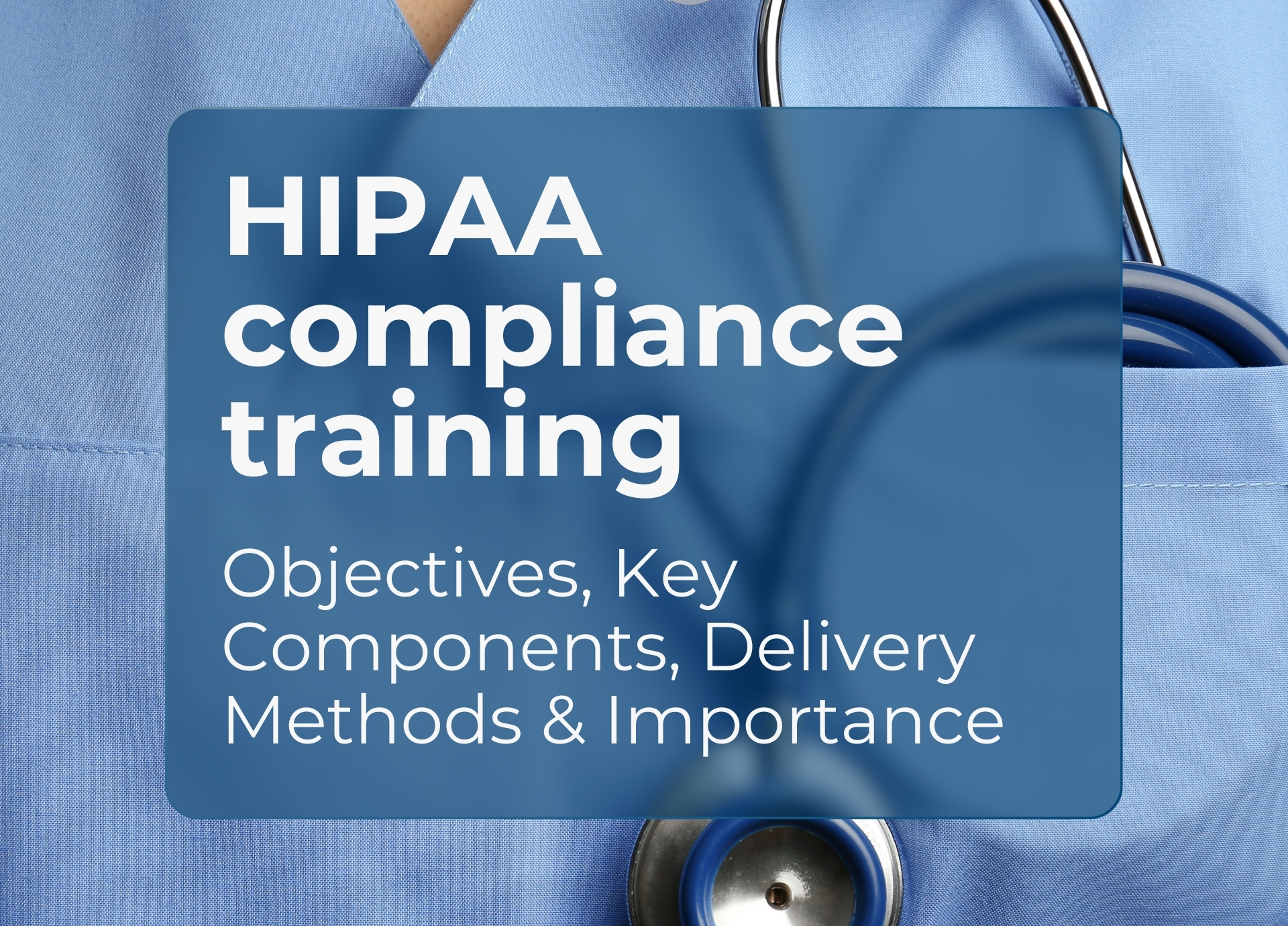
In today’s fast-changing healthcare world, protecting Protected Health Information (PHI) is crucial for keeping patient trust and following the law. The Health Insurance Portability and Accountability Act (HIPAA) establishes privacy and security rules. It’s important for everyone in healthcare organizations, not just compliance officers, to understand and follow these rules. HIPAA compliance training plays a key role here. It provides healthcare workers with the necessary knowledge and skills to protect PHI properly. This training helps them deal with the complex requirements of keeping patient information safe.
Content Table:
Objectives of HIPAA Compliance Training
Key Components of HIPAA Training Programs
Objectives of HIPAA Compliance Training
Covering the Basics of HIPAA
Training programs thoroughly cover key aspects of HIPAA, including the Privacy, Security, and Breach Notification Rules. These rules set guidelines for managing Protected Health Information (PHI), showing how to handle, share, and protect patient data. They also highlight the rights people have over their health information.
Focusing on Privacy and Security
A big part of HIPAA training is about putting privacy and security measures into action. It teaches about the administrative, physical, and technical safeguards needed to keep PHI confidential, integral, and available. The training covers safe ways to handle, store, and send PHI, helping everyone understand these critical practices for their daily work.

Dealing with PHI Breaches
Training also dives into identifying, reporting, and responding to breaches of PHI. It explains what counts as a PHI breach and the necessary steps for reporting it quickly. This includes how to inform affected individuals, the Department of Health and Human Services (HHS), and sometimes the media, after a breach.
Understanding Risk Management
Risk management is a crucial part of HIPAA training. Learners find out how to do detailed risk assessments to spot potential issues in handling PHI. The training offers ways to lessen these risks, helping healthcare organizations proactively tackle security weaknesses and lower the chance of PHI breaches.
Developing Policies and Procedures
Lastly, HIPAA training gives detailed advice on creating, putting into practice, and keeping up with policies and procedures that meet HIPAA rules. This ensures organizations have a strong plan for managing PHI, keeping operational practices in line with HIPAA, and promoting a compliance-focused culture.
Key Components of HIPAA Training Programs
HIPAA Training: Comprehensive and Role-Specific
HIPAA compliance training offers various methods to ensure healthcare professionals, no matter their role, are well-equipped to protect Patient Health Information (PHI) effectively.

Foundation Training for All Staff
General training lays the groundwork, open to all staff members who might handle PHI. This training covers HIPAA regulations broadly, highlighting the critical role of compliance and each employee’s part in protecting patient data. Ensuring that everyone, from administrative workers to healthcare providers, grasps HIPAA’s basics helps cultivate a widespread culture of compliance and awareness.
Tailored Training for Specific Roles
To cater to the diverse roles within a healthcare organization, role-specific training is customized to fit the distinct needs and duties of different positions. This specialized training focuses on the aspects of HIPAA most pertinent to each role, helping staff members gain a deeper understanding of the regulations that affect their daily tasks.
Interactive Learning Techniques
The training incorporates interactive learning methods like real-life scenarios, quizzes, and discussions to make the learning experience engaging and effective. By connecting HIPAA concepts to actual situations, healthcare professionals can better grasp how to deal with complex compliance issues, identify potential risks, and implement best practices in their work environment.
Emphasizing Continuous Education
Training programs stress the importance of ongoing education. Regular updates and refresher courses are crucial for keeping up with changing regulations and ensuring staff members stay focused on their compliance responsibilities.
By blending general and role-specific training with interactive approaches and a commitment to continuous learning, HIPAA compliance training equips healthcare professionals with the necessary tools to fulfill their legal and ethical duties.
Delivery Methods
Diverse HIPAA Training Methods
HIPAA training utilizes various methods to meet the different needs and preferences of healthcare organizations and their employees.
Online Training for Flexibility
Online courses are popular for their flexibility and convenience, allowing learners to progress at their pace. This method is perfect for those with tight schedules or in remote locations, ensuring broad access across large organizations or minimizing daily operation disruptions.
Interactive In-person Workshops
In-person workshops and seminars offer an interactive learning environment with real-time engagement. These sessions allow direct questions, discussions, and the sharing of collective knowledge, enhancing understanding and retention of HIPAA regulations. They’re ideal for exploring complex compliance issues or team-based learning.
Customized In-house Training for Specific Needs
Customized in-house training caters to an organization’s unique requirements and practices. This tailored approach ensures the training content is relevant to staff duties and the organization’s specific compliance challenges, addressing particular concerns and reinforcing internal policies related to HIPAA compliance. By closely aligning with the organization’s context, customized training effectively fosters a culture of compliance.
Importance of HIPAA Compliance Training
Essential Role of HIPAA Compliance Training
HIPAA compliance training is crucial in improving patient information security and integrity within healthcare organizations.
Preventing Data Breaches
Educating staff on handling and protecting Protected Health Information (PHI) reduces data breach risks and unauthorized disclosures. This prevention is key to guarding against threats and vulnerabilities, ensuring patient confidentiality and privacy.
Adhering to Regulatory Standards
Training ensures compliance with the Health Insurance Portability and Accountability Act’s regulations. Beyond rule adherence, it helps avoid penalties, legal issues, and reputational damage from non-compliance. It equips organizations to confidently navigate HIPAA regulations, ensuring compliance across operations and readiness for audits.
Building Trust through Commitment to Privacy
Investing in training demonstrates an organization’s dedication to patient privacy, building trust with patients and clients. This proactive approach in privacy and security training strengthens patient-provider relationships, enhancing the organization’s reputation as a trusted information steward. This trust is crucial for the healthcare system’s integrity and reliability.
HIPAA compliance training is fundamental in the healthcare industry, essential for data breach prevention, regulatory compliance, and patient trust building. As healthcare increasingly adopts digital technologies, the importance of ongoing HIPAA compliance learning and adaptation is paramount. Through consistent training and education, healthcare organizations can maintain high patient privacy and data security standards, ensuring the healthcare system’s integrity.
Q&A Section:
Q: What is the primary objective of HIPAA compliance training?
A: The primary objective is to provide healthcare professionals with a comprehensive understanding of HIPAA regulations, focusing on the Privacy, Security, and Breach Notification Rules. It aims to ensure that PHI is handled securely and that patient privacy is respected and protected.
Q: Who should undergo HIPAA compliance training?
A: All staff members who have access to PHI, including healthcare providers, administrators, IT personnel, and any individual or entity that handles or comes into contact with PHI, should undergo training to understand their responsibilities under HIPAA.
Q: How often should HIPAA training be conducted?
A: HIPAA training is not a one-time activity. Regular updates and refresher courses are necessary to keep up with changes in regulations and ensure continuous compliance.
Q: What are some key components of HIPAA training programs?
A: Key components include general training for all staff, role-specific training tailored to various positions within the organization, interactive learning experiences, and ongoing education to address changes in HIPAA regulations.




